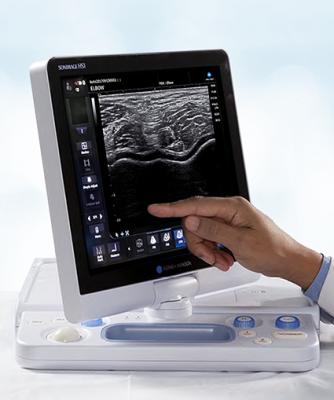
June 12, 2019 — Konica Minolta Healthcare announced a new autologous biologics workshop in partnership with EmCyte Corp. The workshop is part of Konica Minolta Healthcare’s UGPro Solution, an initiative that provides complete solutions for ultrasound-guided procedures and therapies featuring the company’s Sonimage HS1 and Sonimage MX1 ultrasound systems, and including hands-on education and training.
The Autologous Biologics Training Series: Advanced Orthobiology and Sports Medicine for Upper & Lower Extremity Disorders, will be held at EmCyte Corp.’s not-for-profit regenerative medicine training and educational organization, Gulf Coast Biologics, in Fort Myers, Fla. The workshop takes place June 21-23 and is designated for a maximum 17.75 AMA PRA Category 1 Credits by Albert Einstein College of Medicine.
Autologous biologics, for use in regenerative medicine, is a growing field in musculoskeletal (MSK) specialty. Many states are now requiring certification for a clinician to perform ultrasound-guided diagnosis and therapy. This course will enhance the attendees’ knowledge of regenerative medicine with a review of the latest technology in advanced autologous biologics, evidence-based outcomes in biological cell therapeutics and treatment options with biological injections. In addition to learning the principles of MSK ultrasound, participants will also review state scanning protocols and appropriate transducer selection, presets and system optimization features. Hands-on learning using Konica Minolta Healthcare’s Sonimage HS1 and Sonimage MX1 ultrasound systems include diagnostic MSK ultrasound and image-guided intra-articular and intra-tendinous biologic injections on the upper and lower extremities of cadaver specimen.
The latest software release for the HS1 System was developed to enhance the user experience and raise the level of patient care during MSK scanning and interventions. Designed for ease of use and to improve workflow, the UltraAdjust image optimization feature allows imaging parameters to be changed by simply adjusting the depth. Hands-free operation during interventional procedures is enabled with an artificial intelligence (AI)-based voice recognition technology that controls system functions through simple voice commands. Panoramic imaging delivers both qualitative and quantitative information for the clinician by enabling the assessment of larger lesions, constructing a cross-section image of a structure and depicting the relationship of two structures in a single image.
For more information: www.konicaminolta.com/medicalusa


 December 09, 2025
December 09, 2025 









